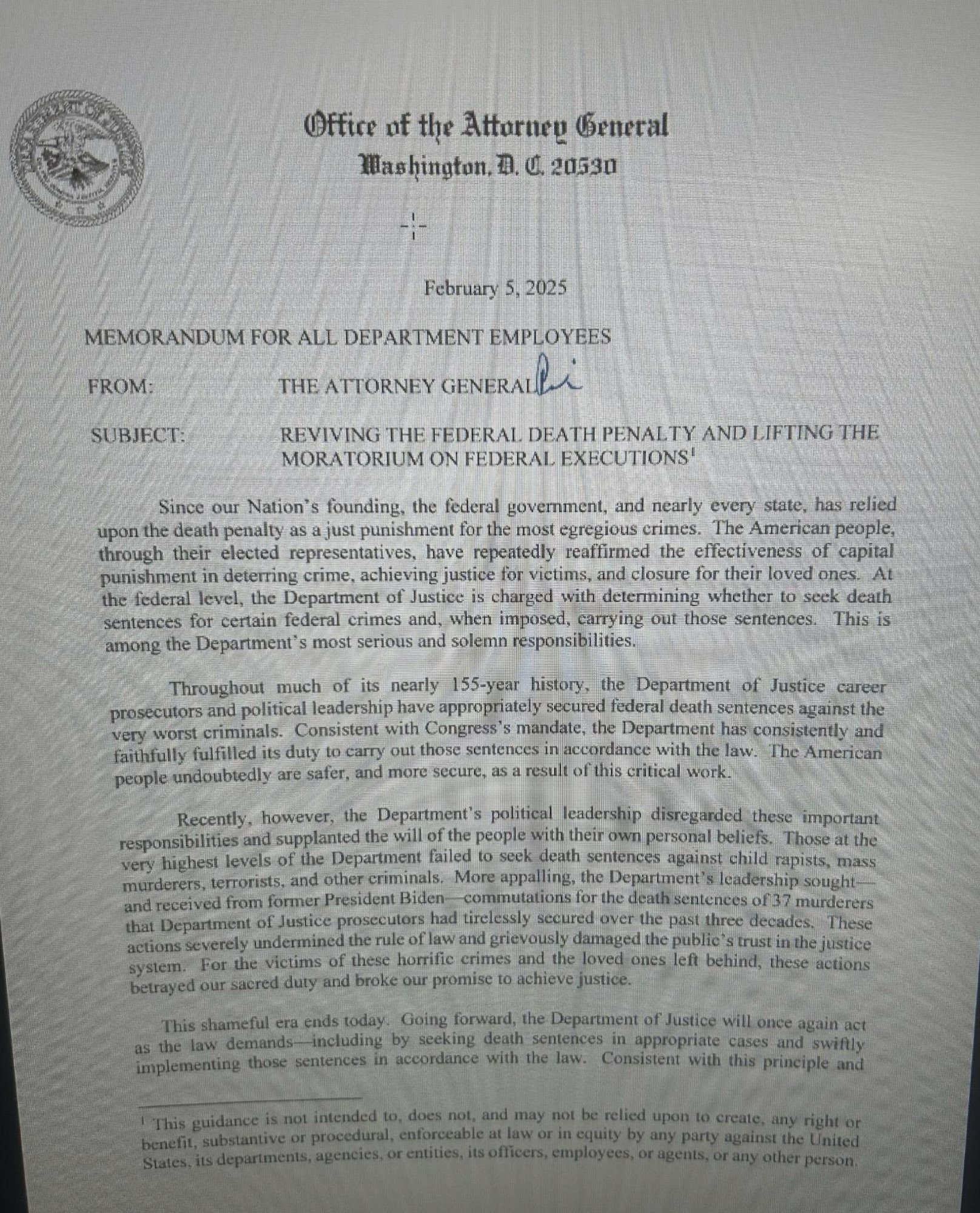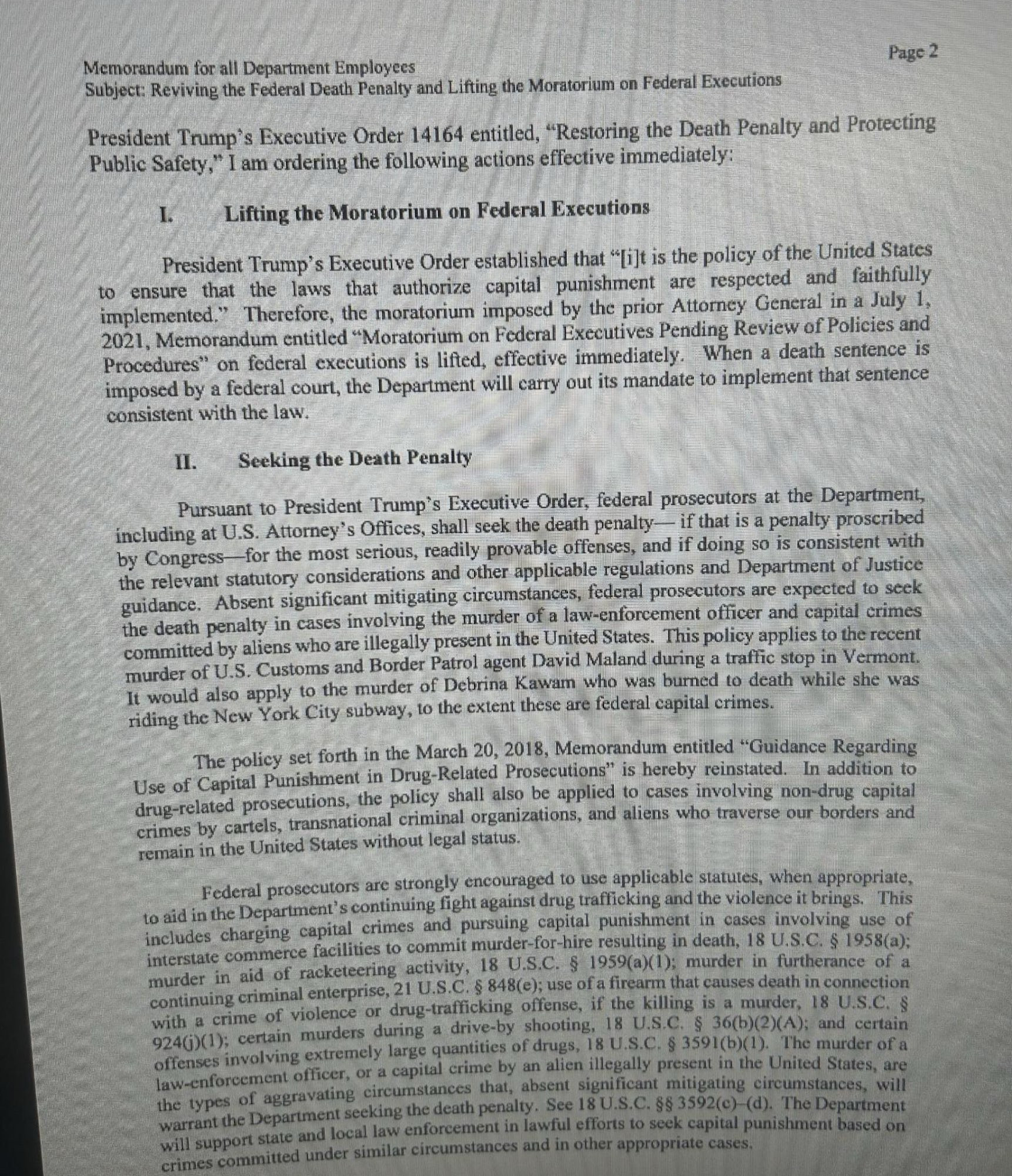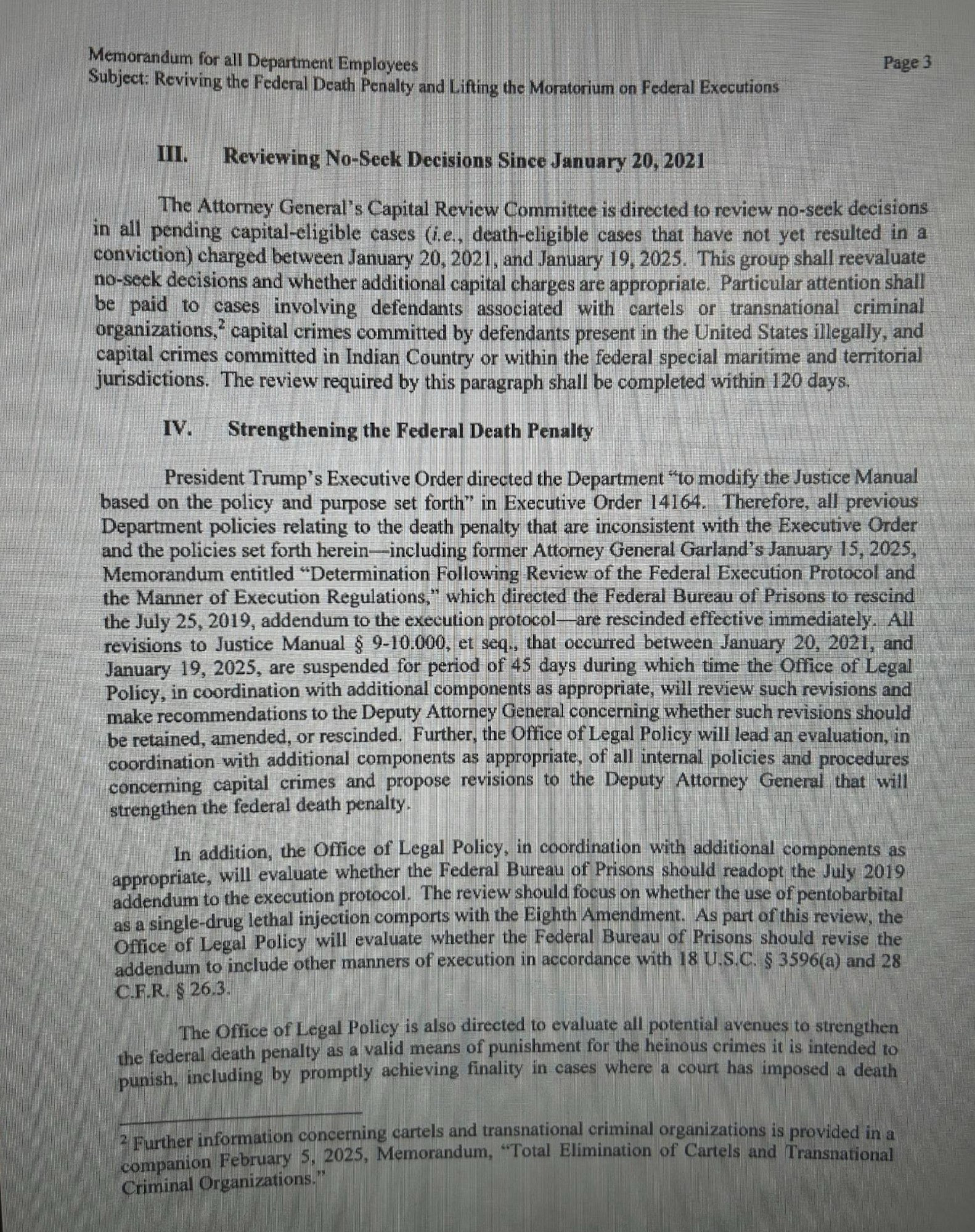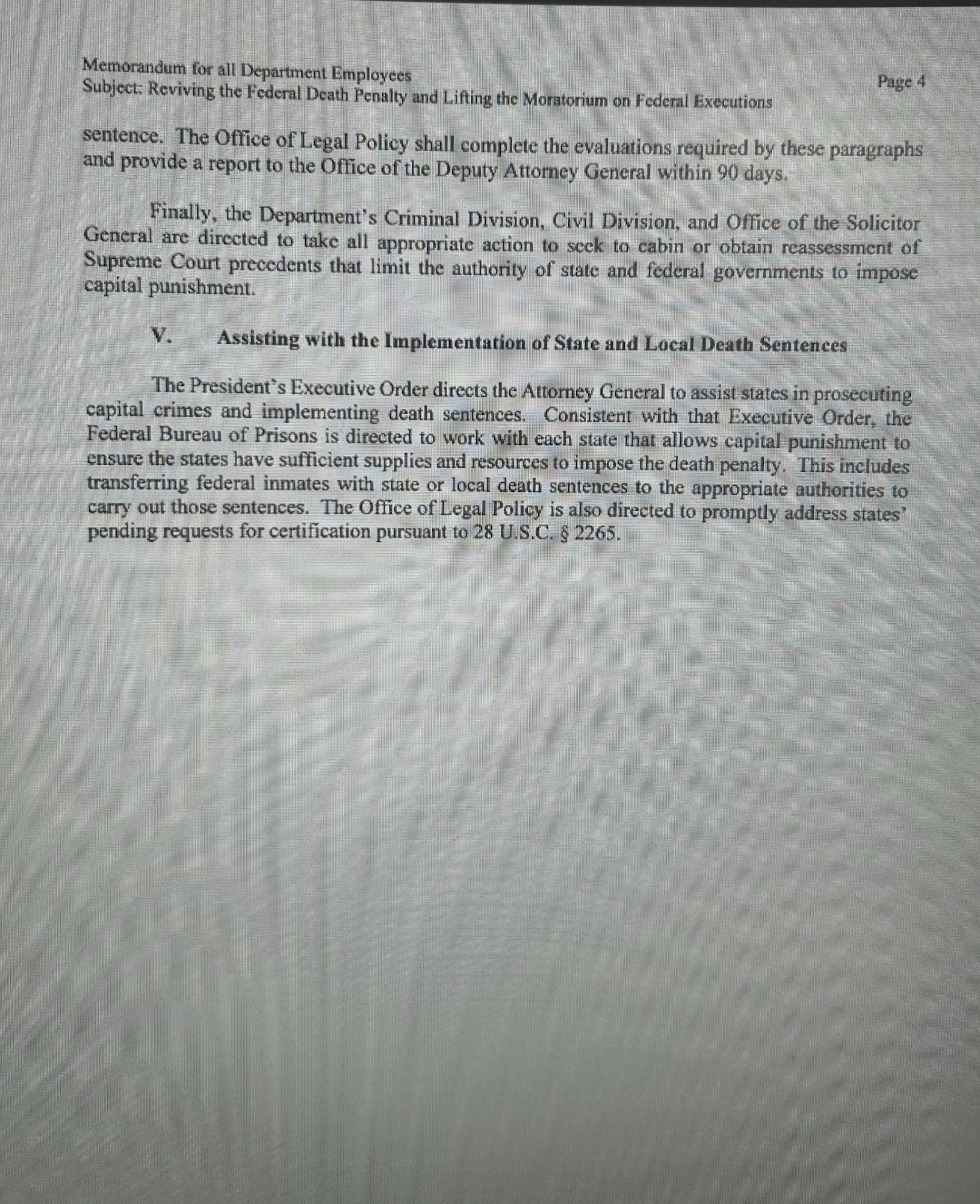Header: Office of the Attorney General Washington, D.C. 20530
February 5, 2025 MEMORANDUM FOR ALL DEPARTMENT EMPLOYEES FROM: THE ATTORNEY GENERAL SUBJECT: REVIVING THE FEDERAL DEATH PENALTY AND LIFTING THE MORATORIUM ON FEDERAL EXECUTIONS[1]
Since our Nation's founding, the federal government, and nearly every state, has relied upon the death penalty as a just punishment for the most egregious crimes. The American people, through their elected representatives, have repeatedly reaffirmed the effectiveness of capital punishment in deterring crime, achieving justice for victims, and closure for their loved ones. At the federal level, the Department of Justice is charged with determining whether to seek death among the Department's most serious and solemn responsibilities.
Throughout much of its nearly 1550year history, the Department of Justice career prosecutors and political leadership have appropriately secured federal death sentences against the very worst criminals. Consistent with Congress's mandate, the Department has consistently and faithfully fulfilled its duty to carry out those sentences in accordance with the lay. The American people undoubtedly are safe, and more secure, as a result of this critical work.
Recently, however, the Department's political leadership disregarded these important responsibilities and supplanted the will of the people with their own personal beliefs. Those at the very highest levels of the Department failed to seek death sentences against child rapists, mass murderers, terrorists, and other criminals. More appalling, the Department's leadership sought -- and received from former President Biden -- commutations for the death sentences of 37 murderers that Department of Justice prosecutors had tirelessly secured over the past three decades. These actions severely undermined the rule of law and grievously damaged the public's trust in the justice system. For the victims of these horrific crimes and the loves ones left behind, these actions betrayed our sacred duty and broke our promise to achieve justice.
This shameful era ends today. Going forward, the Department of Justice will once again act as the law demands -- including by seeking death sentences in appropriate cases and swiftly implementing those sentences in accordance with the law. Consistent with this principle and
Footnote: [1] This guidance is not intended to, does not, and may not be relied upon to create, any right or benefit, substantive or procedural, enforceable at law or in equity by any party against the United States, its departments , agencies, or entities, its officers, employees, or agents, or any other person.
Memorandum for all Department Employees Page 2 Subject: Reviving the Federal Death Penalty and Lifting the Moratorium on Federal Executions
President Trump's Executive Order 14164 entitled, "Restoring the Death Penalty and Protecting Public Safety," I am ordering the following actions effective immediately:
I. Lifting the Moratorium on Federal Executions.
President Trump's Executive Order established that "[i]t is the policy of the United States to ensure that the laws that authorize capital punishment are respected and faithfully implemented." Therefore, the moratorium imposed by the prior Attorney General in a July 1, 2021, Memorandum entitled "Moratorium on Federal Executives Pending Review of Polices and Procedures" on federal executions is lifted, effective immediately. When a death sentence is imposed by a federal court, the Department will carry out its mandate to implement that sentence consistent with the law.
II. Seeking the Death Penalty
Pursuant to President Trump's Executive Order, federal prosecutors at the Department, including at U.S. Attorney's Offices, shall seek the death penalty -- if that is a penalty proscribed by Congress -- for the most serious, readily provable offenses, and if doing so is consistent with the relevant statutory considerations and other applicable regulations and the Department of Justice guidance. Absent significant mitigating circumstances, federal prosecutors are expected to seek the death penalty in cases involving the murder of a law-enforcement officer and capital crimes committed by aliens who are illegally present in the United States. This policy applies to the recent murder of U.S. Customs and Border Patrol agent David Maland during a traffic stop in Vermont. it would also apply to the murder of Debrina Kawam who was burned to death while she was riding the New York City subway, to the extent these are federal capital crimes.
The policy set forth in the March 20, 2018, Memorandum entitled "Guidance Regarding Use of Capital Punishment in Drug-Related Prosecutions" is hereby reinstated. In addition to drug-related prosecutions, the policy shall also be applied to cases involving non-drug capital crimes by cartels, transnational criminal organizations, and aliens who traverse our borders and remain in the United States without legal status.
Federal prosecutors are strongly encouraged to use applicable statutes, when appropriate, to aid in the Department's continuing fight against drug trafficking and the violence it brings. This includes charging capital crimes and pursuing capital punishment in cases involving use of interstate commerce facilities to commit murder-for-hire resulting in death, 18 U.S.C. § 1958(a); murder in aid of racketeering activity, 18 U.S.C § 1959(a)(1); murder in furtherance of a continuing criminal enterprise, 21 U.S.C § 848(e); use of a firearm that causes death in connection with a crime of violence or drug-trafficking offense, if the killing is a murder, 18 U.S.C § 924(j)(1); certain murders during a drive-by shooting, 18 U.S.C § 36(b)(2)(A); and certain offenses involving extremely large quantities of drugs, 18 U.S.C § 3591(b)(1). The murder of a law-enforcement officer, or a capital crime by an alien illegally present in the United States, are the types of aggravating circumstances that, absent significant mitigating circumstances, will warrant the Department seeking the death penalty. See 18 U.S.C §§ 3592(c)-(d). The Department will support state and local law enforcement in lawful efforts to seek capital punishment based on crimes committed under similar circumstances and in other appropriate cases.
Memorandum for all Department Employees Page 3 Subject: Reviving the Federal Death Penalty and Lifting the Moratorium on Federal Executions
III. Reviewing No-Seek Decisions Since January 20, 2021
The Attorney General's Capital Review Committee is directed to review no-see decisions in all pending capital-eligible cases (i.e., death-eligible cases that have not yet resulted in a conviction) charged between January 20, 2021, and January 19, 2025. This group shall reevaluate no-see decisions and whether additional capital charges are appropriate. Particular attention shall be paid to cases involving defendants associated with cartels or transnational criminal organizations, [2] capital crimes committed by defendants present in the United States illegally, and capital crimes committed in Indian Country or within the federal special maritime and territorial jurisdictions. The review required by this paragraph shall be completed within 120 days.
IV. Strengthening the Federal Death Penalty
President Trump's Executive Order directed the Department "to modify the Justice Manual based on the policy and purpose set forth" in Executive Order 14164. Therefore, all previous Department policies relating to the death penalty that are inconsistent with the Executive Order and the policies set forth herein -- including former Attorney General Garland's January 15, 2025, Memorandum entitled "Determination Following Review of the Federal Execution Protocol and the Manner of Execution Regulations," which directed the Federal Bureau of Prisons to rescind the July 26, 2019, addendum to the execution protocol -- are rescinded effective immediately. All revision to Justice Manual § 9-10.000, et seq., that occurred between January 20, 2021, and January 19, 2025, are suspended for period of 45 days during which time the Office of Legal Policy, in coordination with additional components are appropriate, will review such revision and make recommendations to the Deputy Attorney General concerning whether such revisions should be retained, amended, or rescinded. Further, the Office of Legal Policy will lead an evaluation, in coordination with additional components as appropriate, of all internal policies and procedures concerning capital crimes and propose revisions to the Deputy Attorney General that will strengthen the federal death penalty.
In addition, the Office of Legal Policy, in coordination with additional components as appropriate, will evaluate whether the Federal Bureau of Prison should readopt the July 2019 addendum to the execution protocol. the view view should focus on whether the use of pentobarbital as a single-drug lethal injection comports with the Eight Amendment. As part of this review, the Office of Legal Policy will evaluate whether the Federal Bureau of Prison should revise the addendum to include other manners of execution in accordance with 18 U.S.C § 3596(a) and 28 C.F.R § 26.3.
The Office of Legal Policy is also directed to evaluate all potential avenues to strengthen the federal death penalty as a valid means of punishment for the heinous grimes it is intended to punish, including by promptly achieving finality in cases where a court has imposed a death
Footnote: [2] Further information concerning cartels and transnational criminal organizations is provided in a companion February 5, 2025, Memorandum, "Total Elimination of cartels and Transnational Criminal Organizations."
Memorandum for all Department Employees Page 4 Subject: Reviving the Federal Death Penalty and Lifting the Moratorium on Federal Executions
sentence. The Office of Legal Policy shall complete the evaluations required by these paragraphs and provide a report to the Office of Deputy Attorney General within 90 days.
Finally, the Department's Criminal Division, Civil Division, and Office of the Solicitor General are directed to take all appropriate action to see to cabin or obtain reassessment of Supreme Court precedents that limit the authority of state and federal governments to impose capital punishment.
V. Assisting with the Implementation of State and Local Death Sentences The President's Executive Order directs the Attorney General to assist states in prosecuting capital crimes and implementing death sentences. Consistent with that Executive Order, the Federal Bureau of Prisons is directing to work each state that allows capital punishment to ensure the states have sufficient supplies and resources to impose the death penalty. This includes transferring federal inmates with state or local death sentences to the appropriate authorities to carry out those sentences. The Office of Legal Policy is also direct to promptly address states' pending requests for certification pursuant to 28 U.S.C § 2265.



